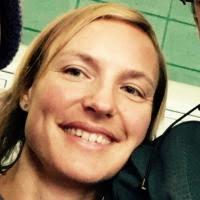Reflections from the Latino Health Forum
Keynote speaker Dr. Jann Murray-García threw an ice cream social when her family moved into their new neighborhood in Davis. Why? She explained, while showing the party invitation as part of her presentation, that she wanted her new neighbors simply to see a picture of her son's face. So that when they saw this young man of color in the neighborhood, they would know what he was doing there and wouldn't regard him as suspicious.
This powerful scenario served as one of many examples in her talk, "Linking Racial Inequality in Schooling to Racial Disparities in Health," in which she demonstrated that increased awareness of racism can provide an opportunity to interrupt the scripts that we have received from our society around race.
"Race is dynamic," she suggested, "and it's dynamically intergenerational." In other words, as young children, we all learn socially-constructed hierarchies implicitly and receive scripts or beliefs about where we lie within them.
Reference group orientation, or "how I think you feel about my racial group" - is distinctly different from the concept of self-esteem, or "how I feel about myself." Dr. Murray-García argued that one "cannot build a coherent sense of self in a world in which these two conflict." She suggested that school may be the first place that a child learns that she or he is a minority, and that the institutional discrimination shown in studies around education and medicine (and in this film clip she showed) can raise significant challenges for youth.
Dr. Murray-García also referred to poor whites as historically "buffers between the white, wealthy, land-owning elite and black folks or Native Americans." They've been told, at least you're not them. She then offered the notion of interrupting such scripts, in order to question traditional messages about who are our adversaries and who are our allies, for the benefit of all children.
Referring to recent successes around Ethnic Studies, Dr. Murray-García asserted: "Kids are ready for a different script."
So what can the Sonoma State University campus community do to lead efforts toward this kind of change? Through active participation in initiatives of the Center for Community Engagement (CCE), we can engage our community through activities that reach out to educators, students and families. And we can reach out to bring community dialogues back to our campus, as in the case of CCE's sponsorship of faculty and staff attendance at the 2016 Latino Health Forum, which allowed us to hear Dr. Murray-García's words of inspiration and action and to share and reflect with our colleagues in support of tomorrow's teachers and leaders.

Author: Marjorie Lear

